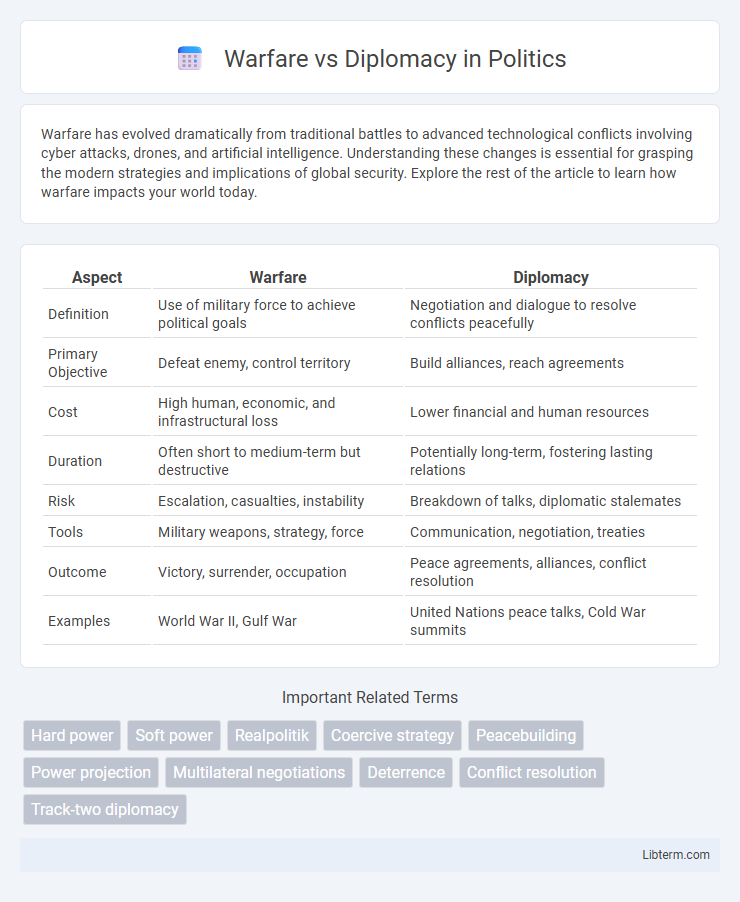Warfare has evolved dramatically from traditional battles to advanced technological conflicts involving cyber attacks, drones, and artificial intelligence. Understanding these changes is essential for grasping the modern strategies and implications of global security. Explore the rest of the article to learn how warfare impacts your world today.
Table of Comparison
| Aspect | Warfare | Diplomacy |
|---|---|---|
| Definition | Use of military force to achieve political goals | Negotiation and dialogue to resolve conflicts peacefully |
| Primary Objective | Defeat enemy, control territory | Build alliances, reach agreements |
| Cost | High human, economic, and infrastructural loss | Lower financial and human resources |
| Duration | Often short to medium-term but destructive | Potentially long-term, fostering lasting relations |
| Risk | Escalation, casualties, instability | Breakdown of talks, diplomatic stalemates |
| Tools | Military weapons, strategy, force | Communication, negotiation, treaties |
| Outcome | Victory, surrender, occupation | Peace agreements, alliances, conflict resolution |
| Examples | World War II, Gulf War | United Nations peace talks, Cold War summits |
Understanding Warfare: An Overview
Warfare involves organized, large-scale conflict typically characterized by military strategies, combat operations, and the use of advanced weaponry to achieve political or territorial objectives. Understanding warfare encompasses studying historical battles, military tactics, technological advancements, and the psychological and economic impacts on societies. This knowledge is essential for analyzing the complexities of conflict and contrasting the approaches and outcomes of warfare versus diplomacy.
Defining Diplomacy in Global Relations
Diplomacy in global relations refers to the practice of managing international relations through negotiation, dialogue, and compromise to achieve peaceful resolutions and mutual interests between nations. It involves the strategic use of communication, cultural understanding, and legal frameworks to prevent conflicts and foster cooperation on global issues such as trade, security, and human rights. Effective diplomacy strengthens alliances and builds trust, reducing the reliance on warfare as a means of resolving disputes.
Historical Conflicts: Warfare’s Role in Shaping Nations
Warfare has played a critical role in shaping nations by redrawing borders and consolidating political power through decisive military victories. Historical conflicts such as the Napoleonic Wars and the World Wars directly influenced the rise and fall of empires, drastically altering geopolitical landscapes. The outcomes of these wars often determined national identities and the balance of power, overshadowing diplomatic efforts during tumultuous periods.
Case Studies: Successful Diplomatic Interventions
Successful diplomatic interventions, such as the Camp David Accords between Egypt and Israel in 1978, demonstrate how sustained negotiation and mutual concessions can resolve deep-rooted conflicts without warfare. The Good Friday Agreement of 1998 exemplifies how inclusive dialogue and power-sharing arrangements can end decades of sectarian violence in Northern Ireland. Similarly, the 2015 Iran nuclear deal highlights the importance of multilateral diplomacy in preventing nuclear proliferation and promoting regional stability.
Costs and Consequences of Warfare
Warfare incurs substantial economic costs, including military expenditures averaging 2-5% of GDP for major powers, alongside infrastructure destruction and loss of civilian lives estimated in millions during prolonged conflicts. The psychological and social consequences manifest in increased displacement, with over 70 million refugees worldwide linked to war zones, and long-term trauma affecting generations. Environmental degradation from warfare further exacerbates recovery challenges, as land contamination and resource depletion hinder post-conflict reconstruction and sustainable development.
Economic and Social Benefits of Diplomacy
Diplomacy fosters stable international trade agreements, promoting economic growth and access to diverse markets while minimizing costly conflicts. Socially, diplomatic efforts encourage cultural exchange and mutual understanding, reducing tensions and fostering peaceful coexistence. Investments in diplomatic channels yield long-term benefits such as sustained prosperity and enhanced global cooperation.
Modern Warfare: Technology and Strategy
Modern warfare emphasizes advanced technology such as drones, cyber warfare, and precision-guided munitions to achieve strategic superiority. Military strategies now integrate real-time intelligence, electronic warfare, and network-centric operations to enhance battlefield effectiveness. The convergence of technology and strategy reshapes conflict dynamics, prioritizing speed, accuracy, and information dominance over traditional troop deployments.
The Power of Dialogue: Diplomacy in Action
Diplomacy leverages dialogue to resolve conflicts, fostering mutual understanding and cooperation between nations. Skilled negotiators use communication strategies to address complex geopolitical issues, preventing escalation into warfare. The power of dialogue lies in its ability to build trust, create alliances, and promote peaceful solutions that safeguard global stability.
Balancing Military Strength and Diplomatic Skill
Balancing military strength and diplomatic skill is essential for sustainable national security and international influence. A robust military deters aggression and enforces strategic interests, while adept diplomacy fosters alliances, reduces conflicts, and promotes cooperation. Effective leaders integrate defense capabilities with negotiation expertise to achieve long-term peace and stability in complex geopolitical landscapes.
Future Trends: Integrating Warfare and Diplomacy
Future trends in integrating warfare and diplomacy emphasize hybrid strategies combining military strength with diplomatic negotiation to address complex global conflicts. Emerging technologies such as cyber warfare, artificial intelligence, and space-based systems reshape conflict dynamics, requiring adaptive diplomatic frameworks to manage escalation and promote stability. Collaborative international efforts and multilateral institutions increasingly prioritize conflict prevention through synchronized defense and diplomatic initiatives, enhancing global security architecture.
Warfare Infographic

 libterm.com
libterm.com